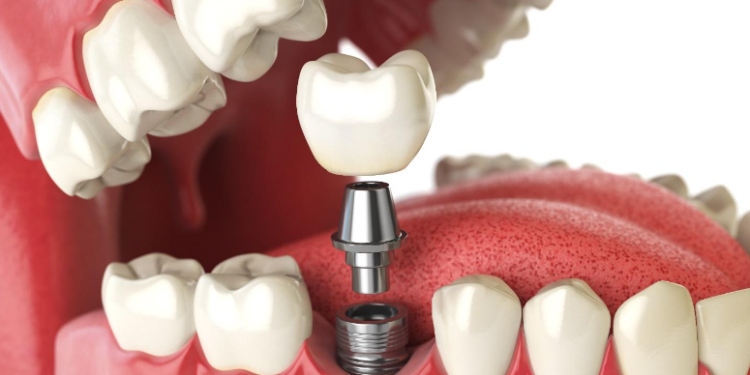Is eating now seeming like a painful chore rather than a simple daily activity? Do you feel embarrassed to speak to friends or family in case they notice any visible imperfections? Are missing teeth beginning to stop you from living your life to the fullest? If any of these newfound issues seem relevant to you, then Dental Implants Leicester may be able to solve your problem!
What are dental implants?
Tooth loss can be very distressing to experience, and you may be desperately looking for a permanent solution as soon as possible. Fortunately, dental implants are a more permanent substitute to removable dentures and can act as a replacement for either a single tooth or even your entire set of teeth if needed. The process of having dental implants fitted is fairly simple and is carried out by a dental surgeon. It involves drilling titanium screws into the jawbone which is then able to support a crown, bridge, or denture. Once the titanium screw is fitted into place, the bone surrounding the implant gradually starts to fuse to it, holding it firmly in place. The process of getting dental implants fitted is as follows:
- Your dentist first carries out a clinical assessment in order to determine whether you are an appropriate candidate for dental implants or not; they do this by taking visual x-rays of your mouth and creating a model of your existing teeth. The x-rays will be able to highlight the areas of your jawbone that require implants to be fitted in and in severe cases, your dentist may carry out further scans to show them how much bone you have and if you require a bone graft before the implant process begins.
- Once this is complete, your dentist will then begin the dental implant procedure which is carried out under a local anaesthetic, making it pain free but still slightly uncomfortable. However, if you feel anxious regarding the treatment, you may consult your dentist and discuss the several sedative options that are available as you may not want to be aware while the procedure is being carried out. The other sedative options that are available include IV sedation or tablets that make you extremely drowsy and less anxious.
- When your mouth becomes numb, or the general anaesthetic begins to work, the dentist will make an incision in the gum and drill a small hole into the jawbone to insert the implant into. They will then seal your gum with stitches if needed, however some people don’t require stitches as the wound heals by itself.
- It is possible that you may be offered new teeth on the same day, however in most cases your jawbone and gums will require time to heal before any dentures or crowns can be attached to the implant. However, if you really don’t want to wait to fill the missing gaps in your teeth, you can choose to have temporary teeth inserted until your jawbone is ready for the implant to be fitted.
- Once the implant is fitted in, you will be offered over-the-counter painkillers to help manage any pain you may experience post op. It can take from four to eight months for the implant to bond completely with your jawbone. During this time, your dentist will provide you with advice and aftercare to look after your implants properly. You will also be offered regular follow-up appointments to ensure your implant has bonded correctly and that the treatment is working.
What are the benefits of having dental implants?

In recent years there has been a drastic increase in the number of people opting for dental implants, and this is simply down to the fact that the benefits of having dental implants fitted are endless; the most important being they provide you with a better quality of life, making simple tasks such as eating and chewing less painful, meaning you can go back to eating your favourite foods and snacks. They also provide you with a new set of natural looking and functioning teeth as the implants are securely fitted into the bone of your jaw. Dental implants are a great way to bring back your confidence which can be affected severely when you begin losing teeth. When you lose a tooth, the bone beneath the gum begins to shrink as there is no stimulation by the tooth root; this can make your face change in shape causing you to look older than you actually are. However, implants prevent bone loss by stimulating the jawbone like a natural set of teeth would.








































